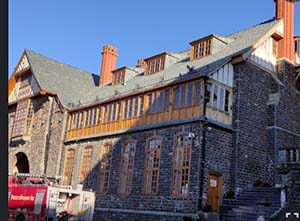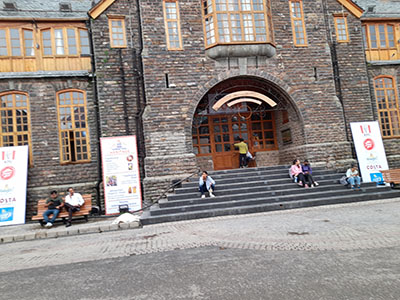SHIMLA: In A significant order, High Court of Himachal Pradesh has restrained the running of the top end Food Court in the iconic Town hall, the seat of the Shimla Municipal Corporation with immediate effect. The municipal commissioner of the Shimla municipal corporation has been directed to stop the operation ensuring compliance of the High Court order.
The court, finding a prima facie case, issued interim relief, restraining respondent nos. 5 & 7- Food chain operator company- from operating the food court.
The State Heritage Advisory Committee was directed to investigate the matter and submit a report by the next hearing on March 14, 2024.
The division bench headed by Chief Justice MS Ramachandra Rao and justice Jyotsna Rewal Dua pronounced this order today.
High Court raised concerns about the bidding process for a high-end café in the Town Hall heritage building. The selected bidder, respondent no.7, deviated from the proposed plan by setting up a food court instead.
The court questioned the logic of allowing a bidder with high net worth but lacking hospitality experience. The issue of structural damages to the heritage property and non-payment by respondent no.7 was also highlighted by the court.
The court emphasized the public interest in preserving the heritage property and expressed dissatisfaction with unanswered questions from the respondents.
The High Court of H.P. expressed concerns about structural changes made by respondents No. 5 & 7 in the Town Hall heritage building, violating the Concession Agreement.
The Court emphasized that only a high-end café was permitted, not a food court. The Municipal Corporation had complied with the Court's directions to set up a high-end café, as specified in the tender documents.
The difference between a high-end café and a food court was highlighted, and the court restrained respondents No. 5 & 7 from operating the food court until further notice.
The State Heritage Advisory Committee was tasked with investigating the matter and submitting a report by the next hearing on March 14, 2024.
The High Court of H.P. raised serious concerns about the deviation from the Concession Agreement in the operation of a food court instead of a high-end café in the Town Hall heritage building.
The court highlighted an agreement between respondent No. 7 and respondent No. 5 for setting up the food court, suggesting it might be beyond the scope of the Concession Agreement.
The court questioned whether the food court, featuring popular brands like Pizza Hut and KFC, could be considered a 'high-end Café' as per the court's directive.
It emphasized that all official documents, including the Request for Proposal and the Concession Agreement, focused on a 'high-end Café,' and nowhere did the term 'food court' appear.
The court expressed concerns about the structural changes made for the food court, potentially impacting the heritage value of the Town Hall.
The court underscored the discrepancy between the intended 'high-end Café' and the actual establishment of a food court, raising issues of compliance with the Concession Agreement and potential harm to the heritage building.
The concession agreement between the Municipal Corporation, Shimla, and respondent No. 7 outlined the scope of the project as setting up a 'high-end Café' in the Town Hall.
The agreement explicitly prohibited structural changes, modifications, or additions to the ground floor area, except for a small designated space for kitchen/pantry purposes.
The operator was also restricted from allowing third-party use or engaging in activities contrary to public order, morality, or decency.
The Fitment Plan, including layout plans and drawings, was required for approval before any internal work on the ground floor. Respondent No. 7 submitted a Fitment Plan, indicating collaboration with respondent No. 5, a franchisee of popular brands like Pizza Hut and KFC. Concerns about third-party use were raised but not adequately addressed.
In short, the agreement focused on a high-end café, emphasizing the preservation of the heritage building and limiting modifications.
The Fitment Plan approval process raised concerns about third-party involvement. The court sought clarification on whether the Concession Agreement allowed for the operation of a food court as depicted in the Fitment Plan and the engagement of a third-party service provider by respondent No. 7.
The Municipal Corporation, Shimla, decided to use the ground floor of the Town Hall for a 'high-end Café' in compliance with a court order, preserving the heritage structure while generating revenue.
Four bidders submitted bids, including respondent No. 7, who lacked experience in the hospitality sector but was selected based on a high net worth under the High Net Worth Route.
The bidding process included minimum eligibility criteria for technical and financial capacity. Respondent No. 7, though lacking technical experience, was considered due to a high net worth. The HP Infrastructure Development Board (HPIDB) asked respondent No. 7 to demonstrate the "appropriate use" of the Town Hall, and the bid evaluation mentioned that all bidders met technical qualifications, which raises concerns.
Respondent No. 7 made a presentation to the HPIDB, which awarded him the concession for a 'high-end Café.' The State Government approved the decision with a condition to preserve the heritage structure.
A letter of award was issued to respondent No. 7 for a 10-year concession with an upfront payment and annual fees.
However, questions arise about respondent No. 7's technical qualifications and the adequacy of a high net worth for the project's success.
The court is puzzled by the deviation from the intended use of a 'high-end Café' and the HPIDB's request for a demonstration of appropriate use. The focus is on whether the Municipal Corporation aimed for heritage preservation or revenue generation.
The court's judgment dated 06.09.2019 in CWPIL No. 19 of 2016 determined the permissible use of the Town Hall in Shimla. The court allowed the Municipal Corporation to have the offices of the Mayor and Deputy Mayor in the Town Hall but prohibited other offices.
It permitted the Municipal Corporation, in consultation with the State Government, to use the remaining area for a 'high-end Café' with reading facilities, an Information Centre, and a Boutique of traditional art & craft.
Subsequently, the Municipal Corporation took possession of the Town Hall and set up the offices of the Mayor and Deputy Mayor.
The ground floor was designated for a 'high-end Café,' and bids were invited. The bidding process involved a request for proposal (RFP) document specifying the project's scope, including the use of the ground floor for a high-end Café with reading facilities, an Information Centre, and a Boutique.
The RFP outlined the conditions, emphasizing the heritage status of the building and prohibiting structural changes. It also detailed the responsibilities of the selected bidder, such as submitting fitment plans, furnishing the space, and making it ready for operations.
The court's directions from the 2019 judgment guided the Municipal Corporation's actions, leading to the utilization of the Town Hall for a 'high-end Café' and related facilities.
The subsequent process involved inviting bids and setting clear guidelines for the selected operator.
The petitioner, Abhimanyu Rathaur, a practicing lawyer, has filed a Public Interest Litigation seeking to quash the tender awarded to a bidder for running a 'high-end Cafe' in the Town Hall, Shimla.
The petitioner contends that the actual establishment in the Town Hall is a 'food court' instead of the permitted 'high-end Cafe,' violating the court's 2019 judgment emphasizing heritage preservation.
The respondents argue that the Municipal Corporation has the discretion to use the Town Hall as deemed fit, and the term 'high-end Cafe' is comparative.
They contend that a realistic 'high-end Cafe' would be financially impractical and that the present setup qualifies as such.
The court dismisses objections regarding the petitioner's locus standi and proceeds to consider the case. It outlines the significance of the Town Hall, its heritage status, and the court's previous orders.
The matter will be further examined based on the petitioner's concerns about the violation of terms and conditions and the respondents' justifications for the current use of the Town Hall.







